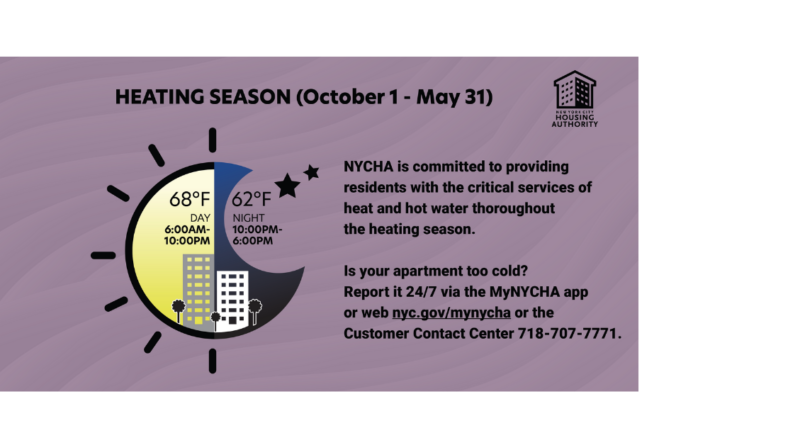NYCHA’s Heat Season Preparations
Preparations for this heat season included preventive maintenance on 1,172 boilers and 1,558 hot water systems, and inspections of 1,627 heat distribution systems
Annual efforts represent the Authority’s ongoing dedication to meeting obligations of the 2019 HUD Agreement while improving the quality of life for residents
In preparation for the 2023-24 heat season, NYCHA performed preventive maintenance on 1,172 boilers and 1,558 tank room hot water systems, and conducted inspections on 1,627 heat distribution systems. Ahead of heat season, which runs from October 1 through May 31, NYCHA also hired 29 additional maintenance workers to bolster the Authority’s Heat Management Services Department (HMSD).
Collectively, these measures represent NYCHA’s dedication to providing the best possible heat and hot water service for residents while mitigating potential heating disruptions and meeting the obligations of the 2019 Agreement with the U.S. Department of Housing & Urban Development (HUD).
“The reliable delivery of heat and hot water at NYCHA developments is something we take very seriously,” said NYCHA Chief Executive Officer Lisa Bova-Hiatt. “We recognize that residents rely on us to do everything in our power to ensure their homes remain warm during the cold winter months, and expect that, in the event of a service interruption, our skilled and dedicated staff members are adequately equipped and available to respond day or night to rectify the situation as soon as possible.”
“As the largest public housing authority in the nation, an incredible amount of work goes into preparing for winter heating season at NYCHA, as well as mitigating challenges as they present themselves throughout the season,” said NYCHA Chief Operating Officer Eva Trimble. “It is our responsibility and privilege to provide the best possible heat service for residents.”
Winter heat season is the period in which all New York City building owners must maintain an indoor temperature of at least 68 degrees between 6 a.m. and 10 p.m. when it’s below 55 degrees outside. From 10 p.m. to 6 a.m., the indoor temperature must be at least 62 degrees, regardless of the temperature outside. This mandate stretches from the beginning of October through the end of May, while hot water must be kept at a minimum temperature of 120 degrees at the source year-round.
To prepare for each heat season, HMSD conducts rigorous annual preventive maintenance beginning in February to preserve and restore equipment reliability. This entails cleaning, lubricating, adjusting, repairing, and replacing worn components, and ensuring equipment and mechanical areas are in satisfactory operating condition. The average age of NYCHA’s boilers is approximately 26 years old, compared to the average expected useful life of a boiler, which is 20 to 25 years old, thus making the work of boiler overhauls and preventive inspections critical to heat season operations.
Additionally, NYCHA has a reserve of staged and non-staged mobile boilers that can be activated in the event of a catastrophic heating emergency. There are currently 24 mobile boilers connected to developments and seven additional mobile boilers that can be accessed if needed.
The Authority has also enhanced staffing of its recent Heating Neighborhood Model ahead of winter heating season, having assigned 37 teams of plumbers and electricians to deploy in response to outages. The Neighborhood Model has realigned hierarchy and reorganized developments into 25 neighborhoods, enabling each heat supervisor and administrator to fully understand the needs of each heat and hot water system within their neighborhood. The new model moves necessary decision-making during an outage closer to the point of delivery, effectively reducing the span of control. Additional benefits include giving NYCHA’s heating staff a deeper understanding of a particular development’s needs and challenges; better distribution of work orders and resources; and closer collaboration between residents, NYCHA staff, and community organizations. The new staffing model also adds additional managerial staff to the evening Heat Desk operations, providing an efficient level of decision-making for issues that arise after traditional business hours and during weekends and holidays.
NYCHA has modernized heating controls at 50 developments and is in the process of completing that work at an additional 10 developments. Apartments that used to be typically overheated are now at a more comfortable range of 72-74 degrees during the day and 69-71 degrees at night, with the heat coming on in cycles to prevent overheating and underheating and to save energy costs. Residents at these buildings will no longer need to open their windows to let out excess heat.
Over the course of the previous winter heating season, NYCHA developments experienced nine percent fewer heat or hot water outages and maintained an eight-hour average restoration time – four hours ahead of the HUD requirement of 12 hours, and 16 hours ahead of the requirement for private landlords to restore services within 24 hours.
Each year, NYCHA also develops a list of critical heat and hot water equipment and systems needing replacement or extensive repair. Last winter, the Authority invested over $78.8 million in heating infrastructure upgrades at 10 developments across Brooklyn, the Bronx, and Manhattan.
Residents experiencing issues with heat or hot water should call the Customer Contact Center at 718-707-7771 or report the issue via the MyNYCHA mobile app or web version.

